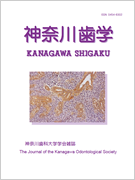- HOME
- > 一般の方
- > バックナンバー:神奈川歯学
- > 37巻1号
- > アブストラクト
アブストラクト(37巻1号:神奈川歯学)

Japanese
| Title : | 拘束ストレス負荷による脳内c-Fos発現の変化とbitingの影響 |
|---|---|
| Subtitle : | |
| Authors : | 金子正明, 堀紀雄*, 湯山徳行** |
| Authors(kana) : | |
| Organization : | 神奈川歯科大学歯科矯正学教室, *神奈川歯科大学歯科補綴学講座, **神奈川歯科大学口腔生理学教室 |
| Journal : | 神奈川歯学 |
| Volume : | 37 |
| Number : | 1 |
| Page : | 23-34 |
| Year/Month : | 2002 / 3 |
| Article : | 原著 |
| Publisher : | 神奈川歯科大学学会 |
| Abstract : | ストレスは身体機能に様々な変化をもたらすことが知られている. ヒト, サル, イヌ, ネコ, ネズミなどの高等動物では, 外部環境の変動に対して自律神経系, 内分泌系の調節機能により, 内部環境のホメオスターシスを保つような反応が見られる. しかし外部環境の変動が大きい場合, あるいは生体に侵襲を起こすような刺激が与えられた場合, ストレス反応として緊急反応や全身適応症候群を起こし, しばしば治療の対象となるような臨床症状を示すことがある. Selye et al1936による実験動物を用いたストレスの研究では, 副腎皮質の肥大, 胸腺や脾臓の萎縮, 胃や十二指腸などの出血や潰瘍の形成が起こることが分かっている1). また, ストレスは脳内に影響を及ぼし, 神経伝達物質およびホルモン, 最初期遺伝子(immediate early gene, IEG)およびそのタンパク質の発現を誘導することが知られている. ストレス刺激により発現, もしくは減少する神経伝達物質, ホルモンとしては, noradrenaline(NA), corticotropin-releasing hormone(CRH), dopamine(DA)などが報告されている2~8). |
| Practice : | 歯科学 |
| Keywords : | c-Fos, brain, biting, restraint stress |
English
| Title : | Effects of Biting on Expression of c-Fos Protein in the Brain of Restraint Stressed Rats |
|---|---|
| Subtitle : | |
| Authors : | Masaaki KANEKO, Norio HORI*, Noriyuki YUYAMA** |
| Authors(kana) : | |
| Organization : | Department of Orthodontics, Kanagawa Dental College, *Department of Prosthetics, Kanagawa Dental College, **Department of Oral Physiology, Kanagawa Dental College |
| Journal : | Kanagawa Shigaku |
| Volume : | 37 |
| Number : | 1 |
| Page : | 23-34 |
| Year/Month : | 2002 / 3 |
| Article : | Original article |
| Publisher : | Kanagawa Odontological Society |
| Abstract : | It has been suggested that expression of the oral para-functions including bruxism during sleep might be a result of stress directed to the person while he or she was awake, and serve to avert various pathophysiological responses that could be triggered by the stressor. In the present study, using immunohistochemical methods to detect the stress-induced expression of Fos protein,we have investigated the effects of biting on the neuronal circuits in the rat brain. Restraint of the rats in supine position on a wooden board for 10, 30 or 60 minutes invariably induced a rapid and transient expression of Fos protein in the nucleus of the neurons in the somatosensory and motor cortexes, hypothalamic paraventricular nucleus, locus coeruleus, medial amygdaloid nucleus and neighboring areas, paraventricular thalamic nucleus, and the anterior part of paraventricular hypothalamic nucleus. Stress-induced Fos expression was analyzed quantitatively by counting the number of Fos-positive nuclei in each region. Fos-positive nuclei progressively increased in most of the regions investigated as the restraint duration was increased from 10 to 60 min. There was, however, no significant increases of Fos-positive neurons found in the ventral posteromedial thalamic, facial, trigeminal, and vagus nucleus at the same time. Having the rat bite a wooden stick during the restraint stress significantly reduced the number of Fos expressing neurons in all regions. The results of the present study clearly indicated that subsets of the brain circuits are susceptible to the restraint stress and express Fos protein. Our finding that biting activity during the restraint stress could suppress the expression of Fos protein in these circuits provides further evidence in support of the assumption that the parafunctional masticatory activity attenuates the effects of stress on the central nervous system. |
| Practice : | Dentistry |
| Keywords : | c-Fos, brain, biting, restraint stress |
